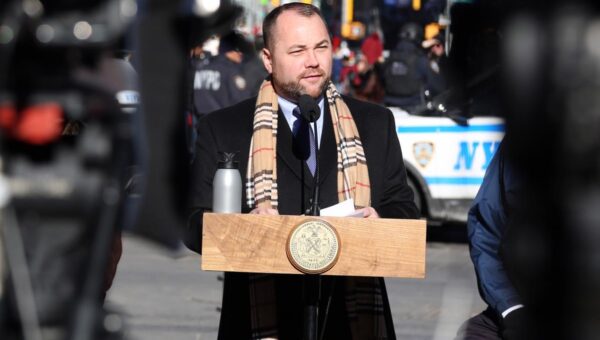
2024 Election: New York Focus

While the race for President and Congressional majorities has been top-of-mind across the country, we wanted to take a closer look at the results for New York City and State. There were dozens of races in the State legislature (Assembly and Senate), and six ballot proposals affecting the state constitution and City Council procedures. Read on for a deep dive into these results.
Federal
While New York State Democrats swept the election on the Senate and House level, the margin of success was a mixed bag. Vice President Harris won the state of New York Presidential contest with 55% of the vote, which was a 5% decrease compared to President Biden’s 2020 win. This decrease occurred in each of the state’s 62 counties. Senator Kirsten Gillibrand easily cruised to re-election, beating her opponent Mike Sapraicone 58-41% and outperforming the top of the ticket by around 3% points. The Democrats flipped three seats in the House of Representatives, bringing the state’s delegation to 19 Democrats and 7 Republicans:
- Laura Gillen defeated Republican incumbent Anthony D’Esposito in District 4
- Josh Riley defeated Republican incumbent Mark Molinaro in District 19
- John Mannion defeated Republican incumbent Brandon Williams in District 22
According to election maps provided by AP, Trump flipped three counties in New York to red during the 2024 election that were previously blue in 2020. Two of the counties were in upstate New York with Clinton and Essex voting Republican, and the third county was Broome, located south of Syracuse.
State
In the state legislature, Democrats kept their majorities in both chambers. In the New York State Senate, the Democrats lost their supermajority by losing one seat, but still hold a firm majority of 40 to 22. The only flipped seat in the State Senate was District 17 in South Brooklyn, where Steven Chan (R) defeated incumbent Iwen Chu (D). Chu was vulnerable to this loss as a brand new state Senator: in 2022, she beat Republican Vito LaBella in 2022 by just 215 votes out of 35,000 votes cast. District 17 includes Bath Beach, Bay Ridge, Bensonhurst, Kensington and Sunset Park, and is a clear example of the growing Republican sway in areas across the City.
While the Dems lost their supermajority in the State Senate, they will keep their supermajority in the State Assembly, controlled by Speaker Carl Heastie of District 83 (located in The Bronx). The Assembly Democrats have 100 seats to the Republicans’ 47 seats, with three races yet to be called. Some notable races include:
- District 4 (Long Island), Rebecca Kassay (D) beat incumbent Ed Flood (R)
- District 16 (Long Island), Daniel Norber (R) beat incumbent Gina Sillitti (D)
- District 21 (Long Island), Judy Griffin (D) beat incumbent Brian Curran(R)
- District 97 (Rockland County), Aron Wieder (D) beat incumbent John McGowan (R)
- District 143 (Erie County), Patrick Chludzinski (R) beat incumbent Monica Wallace (D)
The races that remain uncalled are:
- District 11 (Staten Island): Kwani O’Pharrow (D) 50.5%, Joseph Cardinale (R) 49.5%
- District 23 (Queens): Incumbent Stacey Pheffer Amato (D) 51%, Thomas Sullivan (R) 49%
- District 45 (Brooklyn): Incumbent Michael Novakhov (R) 50.5%, Joey Cohen-Saban (D) 49.5%
Ballot Measures
Proposition 1 was on the ballot statewide, as it pertained to the State constitution, but Propositions 2-6 were only on the ballots of New York City voters, as they pertained to City Council and local government departments. Proposition 1 focused on abortion protection, and the other five propositions were crafted by Mayor Adams’ Charter Revision Commission and were widely seen as granting more power to the Mayor’s office and less power to the City Council.
Propositions 1-5 passed, and Proposition 6 failed:
Prop 1 passed with 61% of the vote, and will add Equal Protection of Law to the state Constitution: individuals cannot be denied rights on basis of ethnicity, national origin, age, disability or sex, including sexual orientation, gender identity, gender expression, pregnancy, pregnancy outcomes, and reproductive healthcare and autonomy. This proposition gives a statewide protection to abortion care, joining Arizona, Colorado, Maryland, Missouri, and Montana in proactively preserving the right to an abortion. After the Supreme Court reversed the abortion protections of Roe v. Wade in its 2022 Dobbs v. Jackson Women’s Health Organization decision, red and blue states around the country have been working to enshrine reproductive health protections in their own constitutions.
Prop 2 passed with 61% of the vote, giving the City’s Department of Sanitation greater authority to clean streets, parks, and city property, and to enforce rules against street vendors, as well as letting the Department set rules for garbage collection. When collecting feedback on the proposition, the Campaign Finance Board received 7 public comments supporting and 14 public comments opposing. A common theme was the proposal’s potential to increase the Department of Sanitation’s surveillance and policing powers, and the negative impact it could have on street vendors. Negative comments came from the Legal Aid Society, New Yorkers Defending Democracy, Surveillance Technology Oversight Project, and The Jails Action Coalition and HALT Solitary Campaign (JAC/HALT) (Ballot Proposal 2 | NYC Votes).
Prop 3 passed with 55% of the vote, requiring City Council to publish fiscal analysis (estimated costs) of proposed laws before holding public hearings and votes. The fiscal analysis will come not only from City Council, but also from the Mayor’s Office of Management and Budget, giving the Mayor expanded input on the City Council’s agenda. In collecting feedback on the proposition, the Campaign Finance Board received 2 public comments in support and 13 public comments in opposition. Just like the rest of propositions 2-6, a common concern was that “this proposal is the result of a politically motivated and rushed Charter Revision Commission,” and that Prop 3 would “make the City government less responsive, imposing redundant review processes for local laws” (Ballot Proposal 3 | NYC Votes).
Prop 4 passed with 57% of the vote, requiring 30-day public notice before City Council votes on legislation involving police, fire or correction departments. In that 30 days, the Mayor and affected City agencies can also hold public hearings. The Campaign Finance Board received 4 public comments in support and 14 in opposition, with concerns that it “could result in excessive bureaucracy and allow the Mayor to interfere in the scheduling of votes which could hinder timely responses to public safety threats, giving the Mayor undue influence over the processes of the City Council.” The comments in opposition came from City Council Speaker Adrienne Adams, the Legal Aid Society, the New York Civil Liberties Union, New Yorkers Defending Democracy, Reinvent Albany, Surveillance Technology Oversight Project, and The Jails Action Coalition and HALT Solitary Campaign (JAC/HALT) (Ballot Proposal 4 | NYC Votes).
Prop 5 passed with 57% of the vote, requiring more detail in certain annual reports on the state of City infrastructure, including information on maintenance costs and needs. The Campaign Finance Board received 2 public comments in support and 9 public comments in opposition, criticizing the “misleading language” and failure to improve transparency in infrastructure planning (Ballot Proposal 5 | NYC Votes).
Prop 6 was the only Charter Revision proposition that failed, with 53% of the voters opposing it. It would have created a new position tasked with supporting minority and women-owned business enterprises, given the Mayor’s office the authority to issue film permits, and allowed two boards that oversee the city archives to merge into one. The Campaign Finance Board received 1 public comment in support and 9 public comments in opposition, with concerns that Prop 6 combines unrelated issues into one proposal, wouldn’t improve government processes or reduce bureaucracy, and the merging of boards could be handled administratively rather than through a Charter Revision Commission (Ballot Proposal 6 | NYC Votes).



